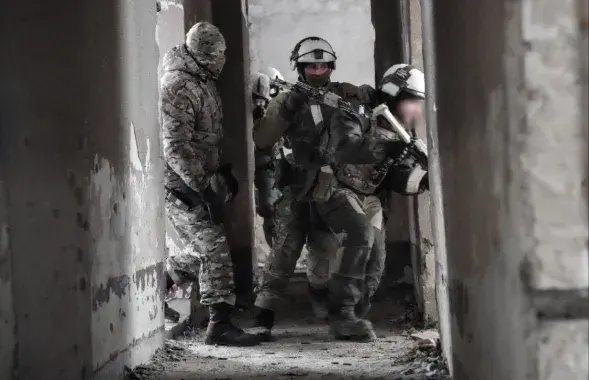Zdanovіch: “Authors can use any spelling”
When the law “On orthography and punctuation of the Belarusian language” is adopted works of Belarusian classics will not be changed but you will be fined for transforming statements of officials into “tarashkevitsa”. The Education Commission of the Belarusian House of Representatives has discussed the project of the law “On orthography and punctuation of the Belarusian language”. ERB found out that mass media would be fined for transforming statements of Lukashenka or other officials into “tarashkevitsa” if the law was adopted.
Uladzіmіr Zdanovіch, head of the Education Commission, explained ERB that authors could use any spelling in theirs works. But they will be punished for transforming statements of officials into “tarashkevitsa”. According to Mr. Zdanovich, nobody is going to change the spelling in the works of Belarusian writers who used and keep using “tarashkevitsa” – for example, Watslaw Lastouski, Uladzimir Arlou and some works of Vasil Bykau (“Long Road Home”):
“Authors have the right to use any spelling if there are people who will read them. No punishment is mentioned in this law. Norms of punishment will be listed in other documents, for example, in the Administrative Code”.
It turns out there will be some punishment for using the spelling worked out by Branislau Tarashkevish at the beginning of the 20th century. But the deputy Zdanivich did not manage to answer what the fines would be and when the changes in the Administrative Code would be introduced.
The first Belarusian newspaper “Nasha Niva” that has always been using “tarashkevitsa” admits that it is possible to change the spelling now. According to the editor-in-chief Andrei Skurko, the editorial board will decide everything:
“The reform has the right to exist. But the authorities are trying to make it a mechanism of repressions at the moment. I think it is totally wrong. The only thing I would like to mention is that “Nasha Niva” will not change its priorities regardless of the spelling we will use”.
The “Rodnae Slova” magazine used by almost all Belarusian teachers will stick to the official spelling if the law is adopted:
“It will be done to avoid variant reading. People have already complained that the information in dictionaries and the spelling in our magazine were different. So we will stick to the official spelling”.
One more interesting moment in the project is the capitalization rules – using capital letter in the names of posts of officials. Some mass media use a capital letter to spell “president” while others use small letters. A question how the words like “minister” and “director” should be spelt arises. The deputy Zdanovich does not know what is to become of the rule either:
“Maybe we should spell all such words with capital letters, like it is done in English. But I think that if we write National with a capital letter we should be writing council with a small one. We can write “Minister” if we show respect to the post of a minister in this country”.
As usual, the law will be adopted. Responsibility for “wrong” usage of the Belarusian language will also be introduced soon.
The poet Henadz Buraukin is sure that it should be specialists who deal with spelling issues, but not deputies who don’t even know what language they are speaking. Moreover, we are dealing with the national heritage:
“First of all, we should help our language get out of the situation it was forced into. Then you can establish order in such things. We are speaking about the intellectual heritage given to us by God and by our ancestors. There will not be any use if so-called representatives like our deputies deal with such issues”.
Uladzіmіr Zdanovіch, head of the Education Commission, explained ERB that authors could use any spelling in theirs works. But they will be punished for transforming statements of officials into “tarashkevitsa”. According to Mr. Zdanovich, nobody is going to change the spelling in the works of Belarusian writers who used and keep using “tarashkevitsa” – for example, Watslaw Lastouski, Uladzimir Arlou and some works of Vasil Bykau (“Long Road Home”):
“Authors have the right to use any spelling if there are people who will read them. No punishment is mentioned in this law. Norms of punishment will be listed in other documents, for example, in the Administrative Code”.
It turns out there will be some punishment for using the spelling worked out by Branislau Tarashkevish at the beginning of the 20th century. But the deputy Zdanivich did not manage to answer what the fines would be and when the changes in the Administrative Code would be introduced.
The first Belarusian newspaper “Nasha Niva” that has always been using “tarashkevitsa” admits that it is possible to change the spelling now. According to the editor-in-chief Andrei Skurko, the editorial board will decide everything:
“The reform has the right to exist. But the authorities are trying to make it a mechanism of repressions at the moment. I think it is totally wrong. The only thing I would like to mention is that “Nasha Niva” will not change its priorities regardless of the spelling we will use”.
The “Rodnae Slova” magazine used by almost all Belarusian teachers will stick to the official spelling if the law is adopted:
“It will be done to avoid variant reading. People have already complained that the information in dictionaries and the spelling in our magazine were different. So we will stick to the official spelling”.
One more interesting moment in the project is the capitalization rules – using capital letter in the names of posts of officials. Some mass media use a capital letter to spell “president” while others use small letters. A question how the words like “minister” and “director” should be spelt arises. The deputy Zdanovich does not know what is to become of the rule either:
“Maybe we should spell all such words with capital letters, like it is done in English. But I think that if we write National with a capital letter we should be writing council with a small one. We can write “Minister” if we show respect to the post of a minister in this country”.
As usual, the law will be adopted. Responsibility for “wrong” usage of the Belarusian language will also be introduced soon.
The poet Henadz Buraukin is sure that it should be specialists who deal with spelling issues, but not deputies who don’t even know what language they are speaking. Moreover, we are dealing with the national heritage:
“First of all, we should help our language get out of the situation it was forced into. Then you can establish order in such things. We are speaking about the intellectual heritage given to us by God and by our ancestors. There will not be any use if so-called representatives like our deputies deal with such issues”.

















